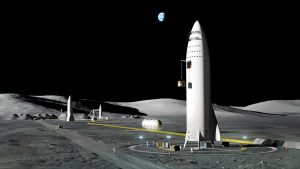Oct 02 2017
Rocket Travel
 Elon Musk is an interesting guy. Also, because of the success of SpaceX, when he makes promises about future technology, it is at least worth a listen. At a recent meeting of the International Astronautical Congress Musk stated that he plans on developing SpaceX’s rocket technology for commercial transportation between cities on Earth. He also made a promotional video.
Elon Musk is an interesting guy. Also, because of the success of SpaceX, when he makes promises about future technology, it is at least worth a listen. At a recent meeting of the International Astronautical Congress Musk stated that he plans on developing SpaceX’s rocket technology for commercial transportation between cities on Earth. He also made a promotional video.
The idea of using rocket travel for long distances (instead of jets) is not new. It has been featured in various science-fiction views of the future or even alternate realities of the present. The obvious advantage to rocket travel is that it is fast. A suborbital trajectory can get you between almost any two cities on Earth in 30 minutes or less.
This is all part of SpaceX’s new project, the BFR (I could not find anywhere exactly what that stands for – just the implication that it’s “Big Fu**ing Rocket”, which is awesome). Musk wants to stop developing his Falcon series of rockets and focus entirely on one rocket system to do everything they need to do – the BFR. The idea is that this will help reduce overall costs.
The BFR is completely reusable, which is key to cost control. Musk plans to use the rocket to put satellites into orbit, resupply the space station, send people to the moon, and even send people to Mars and rocket them between cities on Earth.
I like the idea of perfecting one rocket design and using it for everything. Part of the key to its flexibility is that it can be refueled in space. So you can use up your fuel to get into orbit, then refuel for a boost to the moon or Mars.
Musk is also very intent on making the BFR pay for itself. Using it for passengers is part of that overall plan.
OK – so what are the hurdles to making rocket travel on Earth a reality?
Cost is the obvious big hurdle. Few people can afford to pay tens of thousands of dollars for one trip. You could also charter your own luxury jet for that much. Musk will have to get the costs way down to make the enterprise feasible. He plans to do that, but we’ll see.
Safety is also a huge factor. SpaceX has successfully landed 16 rockets in a row, which is great. But for routine commercial travel they will need a much greater safety record. Musk plans to use the BFR city-to-city transport for cargo for a while (no passengers) which is a great idea. SpaceX could build up years of experience with hundreds or thousands of successful trips before taking passengers. This raises the question of whether or not cargo transport by rocket can pay for itself, which is a factor Musk prioritizes.
Logistics and overall travel time is also a factor. How many point-to-points facilities will they have? What will the security be like? The video shows passengers taking a boat out to the launch pad. Will there also be a boat ride at the other end?
If you happen to live near one of the serviced cities and you need to travel half way around the world, this may be a great option. Otherwise, the advantage in total travel time may not be worth it. If you have to make a connecting flight to get to a rocket-serviced city, that takes time. The actual rocket flight time may be the smallest factor.
These same issues come up with supersonic flight. Will rocket travel be more convenient and cost effective than just really fast jets? Perhaps. One advantage is that the travel time is much shorter.
So, overall I like the idea of the flexible and cost-effective BFR. I like that Musk is willing to think about and attempt to develop future game-changing technology. Almost by definition, many such ventures will fail, but you have to try to succeed. I give commercial rocket travel a low probability overall, mainly for logistical and cost reasons, but it is not implausible. Perhaps the most plausible aspect of the plan is that it uses the same rocket SpaceX will be using for everything else.
I also like Musk’s plan to find commercial uses for the BFR that make money, and then using that to finance more speculative ventures like developing a moon base or going to Mars. I still don’t think we will be sending anyone to Mars anytime soon. Musk plans on 2024, which he admits is aspirational, but there are some logistical deal-breakers at the moment – like radiation and supplies.
I do like that Musk is not just a dreamer, but a planner. He is actually developing technology and searching for ways to innovate and change the world. It is easy to cynically criticize his optimism and lofty plans, but to some extent he is getting it done. Just watch one of SpaceX’s rockets do a vertical landing and I dare you not to be impressed. So I say – you go, Elon.






